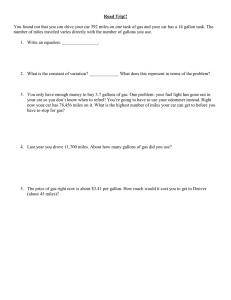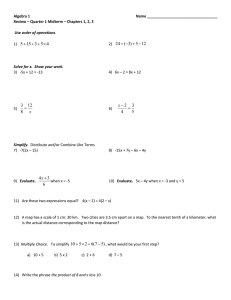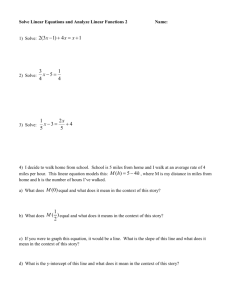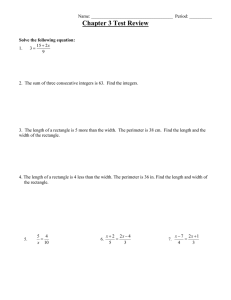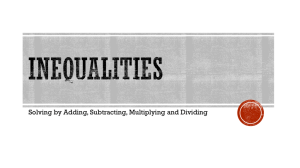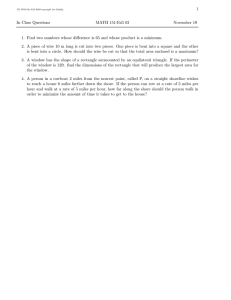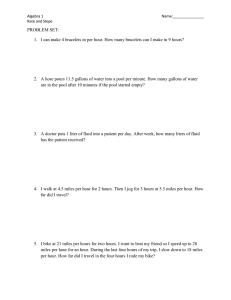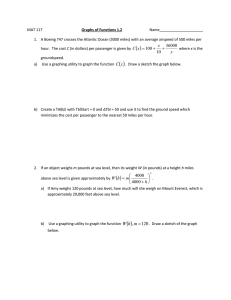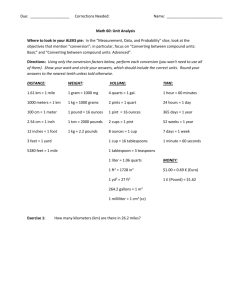2010 Leap Frog Relay Grades 6-8 Part I Solutions
advertisement
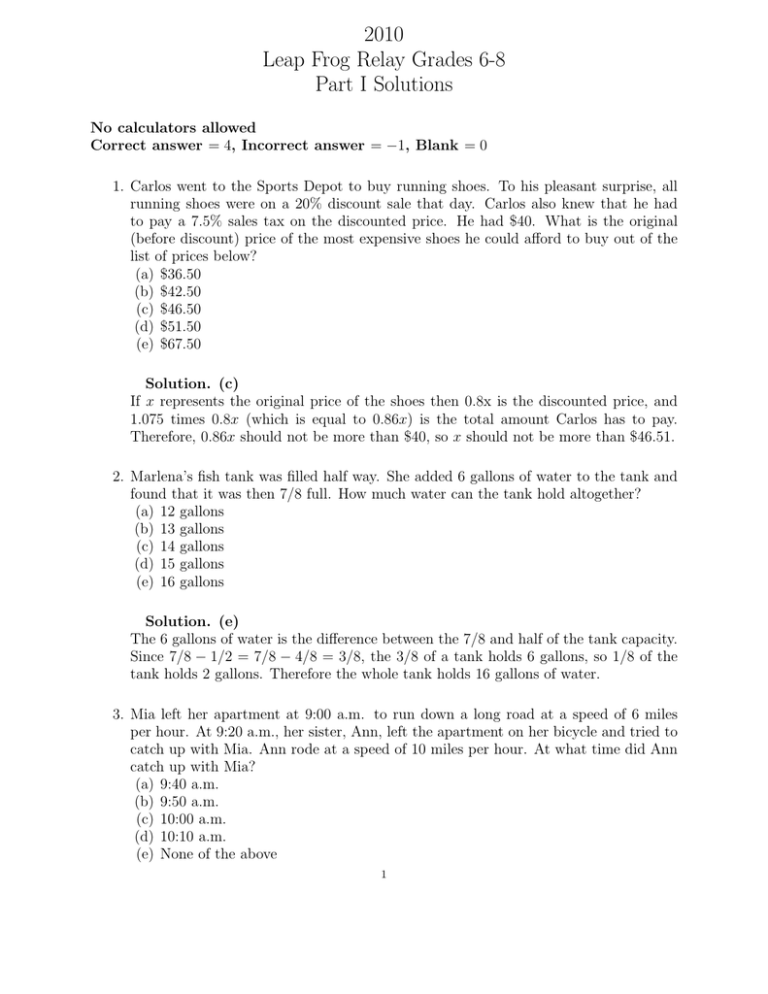
2010 Leap Frog Relay Grades 6-8 Part I Solutions No calculators allowed Correct answer = 4, Incorrect answer = −1, Blank = 0 1. Carlos went to the Sports Depot to buy running shoes. To his pleasant surprise, all running shoes were on a 20% discount sale that day. Carlos also knew that he had to pay a 7.5% sales tax on the discounted price. He had $40. What is the original (before discount) price of the most expensive shoes he could afford to buy out of the list of prices below? (a) $36.50 (b) $42.50 (c) $46.50 (d) $51.50 (e) $67.50 Solution. (c) If x represents the original price of the shoes then 0.8x is the discounted price, and 1.075 times 0.8x (which is equal to 0.86x) is the total amount Carlos has to pay. Therefore, 0.86x should not be more than $40, so x should not be more than $46.51. 2. Marlena’s fish tank was filled half way. She added 6 gallons of water to the tank and found that it was then 7/8 full. How much water can the tank hold altogether? (a) 12 gallons (b) 13 gallons (c) 14 gallons (d) 15 gallons (e) 16 gallons Solution. (e) The 6 gallons of water is the difference between the 7/8 and half of the tank capacity. Since 7/8 − 1/2 = 7/8 − 4/8 = 3/8, the 3/8 of a tank holds 6 gallons, so 1/8 of the tank holds 2 gallons. Therefore the whole tank holds 16 gallons of water. 3. Mia left her apartment at 9:00 a.m. to run down a long road at a speed of 6 miles per hour. At 9:20 a.m., her sister, Ann, left the apartment on her bicycle and tried to catch up with Mia. Ann rode at a speed of 10 miles per hour. At what time did Ann catch up with Mia? (a) 9:40 a.m. (b) 9:50 a.m. (c) 10:00 a.m. (d) 10:10 a.m. (e) None of the above 1 Solution. (b) Mia has run 2 miles away from the apartment by 9:20. Since Ann bikes 4 miles per hour faster than Mia runs, she makes up 4 miles in each hour. Therefore, it takes her half an hour to make up Mias original 2 miles advantages. She will catch up with Mia at 9:50 a.m. 4. There are 43 people on a birthday party. Everyone shakes hands with everyone else. How many handshakes are made? (a) 42 (b) 84 (c) 85 (d) 903 (e) 1806 Solution. (d) Each person shakes 42 hands. A handshake is between two people: when A shakes B’s hand, it is also counted as a handshake that B made with A. Therefore, the number of handshakes is only the half of 43 times 42. 5. The weight of a third of a large pizza and three and a half cups of orange juice is the same as the weight of three fourth of a large pizza and a half cup of orange juice. A cup of orange juice weighs a fourth of a pound. What is the weight of a large pizza in pounds? (a) 1.8 pounds (b) 2 pounds (c) 2.4 pounds (d) 3 pounds (e) 3.6 pounds Solution. (a) The difference between the weights of the two pizza pieces is as much as the difference between the weights of the orange juices. So, 5/12 of the pizza weighs as much as 3 cups of orange juice, which is 3/4 pounds. Therefore, the weight of a whole pizza is 3/4 times 12/5 pounds, which is 1.8 pounds. 6. How many different teams of 4 runners can be selected from a group of 7 runners? (a) 24 (b) 28 (c) 35 (d) 840 (e) None of the above Solution. (c) Any of the 7 runners can be selected to be the first team member, any of the remaining 6 to be the second, etc. That gives us (7)(6)(5)(4)= 840 choices. However, since it does not matter who was selected at what time, only that the person is in the team, we should divide this result by (4)(3)(2)(1)= 24 (the different orders of selecting the 4 members), so there are only 35 different teams. (Note: “7 choose 4” is 35.) 2 7. Raul can ride his bicycle uphill at 4 miles per hour and downhill at 12 miles per hour. How far uphill in miles should he travel if he wants his round trip (uphill plus downhill) to last half an hour? (a) 1mile (b) 1.5 miles (c) 2 miles (d) 2.5 miles (e) 4 miles Solution. (b) If s is the traveled distance in miles, then the time spent going uphill is s/4 hours, and the time spent traveling downhill is s/12 hours. The sum of these two quantities should be 1/2 hour. Solving the equation s/4 + s/12 = 1/2 gives 1.5 (miles) for s. 8. If both the length and the width of a rectangle are increased by 50%, what happens with the area of the rectangle? (a) The area of the rectangle increases by 25%. (b) The area of the rectangle increases by 50%. (c) The area of the rectangle increases by 100%. (d) The area of the rectangle increases by 250%. (e) None of the above. Solution. (e) If l and w are the length and width of the original rectangle, then, after increasing the sides, the area of the rectangle becomes (1.5l)(1.5w) = 2.25lw, which means a 125 % increase. 9. There are chicken and rabbits on a farm. The total number of animal legs is 112, and the total number of animal heads is 44. What is the difference between the number of chicken and the number of rabbits on the farm? (Note: You may assume that each animal has the usual number of legs and heads.) (a) 10 (b) 12 (c) 20 (d) 32 (e) None of the above Solution. (c) Each animal has at least 2 legs. If all the animals would be chicken, then for the 44 animals we would use 88 legs. Since there are 112 legs, there are 24 “extra legs” available, which can form 12 pairs of legs, so there are enough legs for 12 of the 4legged rabbits. The remaining 44 − 12 = 32 animals are chicken. Therefore, there are 20 more chicken than rabbits. 10. How many divisors does the number 792 have? (a) 6 (b) 10 (c) 20 (d) 24 3 (e) None of the above Solution. (d) Since the prime factorization of 792 is (23 )(32 )(111 ), 792 has (3 + 1)(2 + 1)(1 + 1) = 24 divisors. The divisors are as follows: 1, 2, 3, 4, 6, 8, 9, 11, 12, 18, 22, 24, 33, 36, 44, 66, 72, 88, 99, 132, 198, 264, 396, 792. 4 2010 Leap Frog Relay Grades 6-8 Part II Solutions No calculators allowed Correct answer = 4, Incorrect answer = −1, Blank = 0 1. Assuming the pattern in this triangle of numbers is continued on, what will the sum of the numbers in the 10th row be? 1 7 13 (a) (b) (c) (d) (e) 3 5 9 15 11 17 19 785 234,000 1,250 1,000 100 Solution: (d) Look at the sums of the 4 displayed rows: 1, 8, 27, 64; the pattern seems to be that the nth row sums to n3 , so the tenth row should sum to 1000. Let’s prove this. The number of entries in the first n rows is 1 + 2 + + n = n(n + 1)/2, and the sum of the first k odd numbers is 1 + 3 + + (2k − 1) = k 2 . Therefore the sum of the entries in the first n rows is the sum of the first n(n + 1)/2 odd numbers, [n(n + 1)/2]2 . Likewise, the sum of the entries in the first n−1 rows is the sum of the first (n−1)n/2 odd numbers, [(n − 1)n/2]2 .Thus the sum of the entries in row n is [n(n + 1)/2]2 − [(n − 1)n/2]2 = n3 . 2. A 9-liter pail is filled with water at the rate of will it take to fill 2/3 of this pail? (a) (b) (c) (d) (e) 1 2 liter per minute. How many minutes 10 minutes 11 minutes 12 minutes 13 minutes 7 minutes Solution: (c) (1/2)X = (2/3)(9) = 6; so X = 12. 3. What is the area of a square with a diagonal of length 20 as shown in the figure? 20 1 (a) (b) (c) (d) (e) 10 50 100 200 400 Solution: (d) x2 + x2 = 202 by the Pythagorean theorem, hence, x2 = 200 which is the area. 4. ABC is a right triangle with hypotenuse 10 and inscribed circle of radius 2. Find the sum of the lengths of the two legs: AB and CB. A B C (a) (b) (c) (d) (e) 14 5 10 24 13 Solution: (a) From the diagram, we see that AC = x + y= 10, so AB + BC = 4 + x + y = 14. A x x 2 y 2 C y 2 B 5. Four times the difference of a number and 3 is the same as 1 added to three times the number. Find the number. (a) (b) (c) (d) (e) 4 2 13 5 15 2 Solution: (c) 4(x − 3) = 1 + 3x 4x − 12 = 1 + 3x x = 13 6. Which of figures A, B, C, D, or E has the same perimeter as figure X? 5 X 7 5 A 5 7 B 5 7 C 7 5 D 7 5 E 7 (a) (b) (c) (d) (e) Solution: (b) Since it has the same length around the figure as fig. X, for obvious reasons. 7. The measure of an angle is 5 times the measure of its complement. Find the measure of the angle in degrees. (a) (b) (c) (d) (e) 25 75 15 42 90 Solution: (b) X = 5(90 − X) = 450 − 5X implies 6X = 450, or X = 75. 8. If the following lengths are arranged from shortest to longest, which one would be in the middle? 7 feet 25 centimeters 3 meters 80 inches 1 kilometer (a) (b) (c) (d) (e) 7 feet 25 centimeters 3 meters 80 inches 1 kilometer 3 Solution: (a) 25 cm < 80 in < 7 ft < 3 m < 1 km. 9. Given that a, b, and c are all positive, and that ab = 21, ac = 18, and bc = 42, find a + b + c. (a) (b) (c) (d) (e) 22 12 14 47 16 Solution: (e) b = 21/a and c = 18/a so bc = (21)(18)/a2 = 42 which transforms to a2 = 9, or a = 3. So then 3b = 21 implies b = 7; and bc = 42 implies that c = 6; therefore the solution is 3+7+6=16 10. A machine can fill 50 boxes of nails in 8 minutes. Each box contains 200 nails. How many boxes can the machine fill in one hour? (a) (b) (c) (d) (e) 375 boxes 50 boxes 6 14 boxes 450 boxes 520 boxes Solution: (a) 50 boxes = 6 14 boxes in 1 minute. So, in 1 hour, 8 minutes boxes or 60 minutes, the machine fills 6 14 × 60 minutes = 360 boxes + 60 boxes = 4 minute (360 + 15) boxes = 375 boxes. The machine fills at a rate of 4
